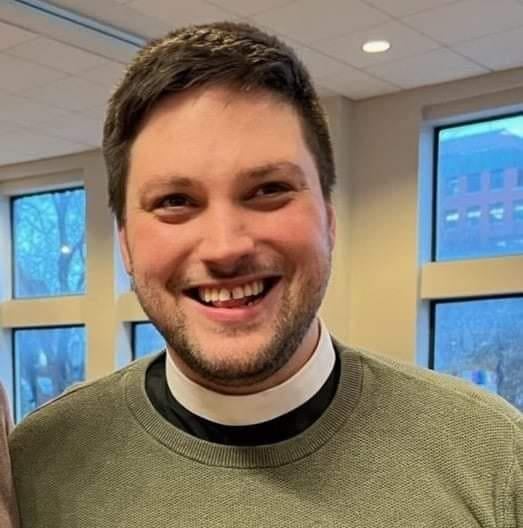Trinity Sunday-Year C
Sunday, June 15, 2025
The Rev. David Wilcox
In the name of the holy, life-creating, and undivided Trinity—Father, Son, and Holy Spirit. Amen.
Today the church celebrates Trinity Sunday, one of the principal feasts of the church year. It is a feast affectionately known among many clergy by another name: a preacher’s worst nightmare. It’s called that because, unlike other feast days that commemorate events in the life of Jesus or the lives of the saints, Trinity Sunday commemorates a doctrine—and not just any doctrine, but the most central and mysterious doctrine of all: the Trinity.
Preaching on the Trinity is notoriously difficult. No matter what you say, you’re likely to slip into heresy at some point. That’s why many priests try to pass this Sunday off to the deacon, the lay preacher, a seminarian. Lord knows how many times I’ve preached on this feast for those reasons. But as I did, I came to appreciate it as an opportunity to immerse myself in this core truth of our faith little by little year after year.
Saint Augustine once said:
“There is no subject where error is more dangerous, investigation more laborious, and discovery more fruitful than the oneness of the Trinity.”
Now, don’t worry, I won’t bore you with a long, detailed, complex, and mind-boggling explanation of what the Trinity is, how it works, or exactly how each Person relates to the others.
If that’s what you were hoping for, I offer my sincerest apologies—and direct your attention to the Creed of Saint Athanasius in the back of the prayer book. Page 864, if you’re curious. But be warned: the print is really small, and it’s not for the faint of heart. If reading small print isn’t your thing, try YouTube—look up Saint Patrick’s Bad Analogies. It makes the same point and it’s a lot more fun.
I will, however, say two very important things about the Trinity:
The Trinity is a mystery.
The Trinity is relational.
The Catechism of the Catholic Church says of the doctrine:
“The mystery of the Most Holy Trinity is the central mystery of Christian faith and life. It is the mystery of God in Himself. It is therefore the source of all the other mysteries of faith, the light that enlightens them.”
Now, that’s true—but do they really have to say “mystery” four times in the same definition?
Calling the Trinity a mystery simply means that we cannot fully understand it. Saint Cyril of Jerusalem, who served as the bishop of that city in around 350 AD once said:
“We explain not what God is, but candidly confess that we have not exact knowledge concerning Him.”
In other words, we don’t know exactly what God is—but we have a pretty good idea what God isn’t. And that just has to be okay.
We cannot fully understand the Trinity, but we can experience it. One thing we can say for sure is that the Trinity is relational. From eternity, Father, Son, and Holy Spirit exist in perfect communion—giving and receiving love and creative energy.
Martin Luther, when asked, “What did God do before He created heaven and earth?” famously responded,
“He created hell for people who ask stupid questions.”
But despite Luther’s crankiness, theologians agree: God has always been loving. God has always been creating.
We get a glimpse of that creative love in today’s reading from Proverbs, where Holy Wisdom—who the Church has long associated with Christ and the Spirit—cries out in the public square, not hidden, not remote, but present at the very beginning of God’s work. Wisdom says:
“The Lord created me at the beginning of his work, the first of his acts of long ago… then I was beside him, like a master worker; and I was daily his delight.”
This passage tells us two things. First This isn’t just a poetic aside. It’s a revelation of the inner life of God: that the Trinity is not locked in abstract stillness, but overflowing in delight, in movement, in creative joy. The Spirit of Wisdom speaks not only to our minds but to our hearts—calling all people into the heart of divine love.
Second, it reminds us of the limitations of human language and thought for at the same time as it reveals to us the creative joy that is the inner life of God it is possible to walk away from it with a notion that the Son or Spirit were created, something the early church denied with all its might.
And in today’s Gospel from John, Jesus says something curious and compassionate to his disciples:
“I still have many things to say to you, but you cannot bear them now.”
“When the Spirit of truth comes, he will guide you into all the truth…”
The Trinity is not static; God’s revelation is dynamic and unfolding. Jesus promises the Spirit, whose descent we celebrated last Sunday, who will guide us—gently, patiently—into deeper and deeper truth. That is, into deeper relationship. We have received the fullness of God’s revelation in Christ, but as St. Paul reminds us in his letter to the Ephesians the riches of Christ are unsearchable, and we can never know the fullness of them on this side of the grave.
God is relationship. According to one theologian, while we humans experience relationships as things we enter and exit throughout our lives, God is relationship. And if we are made in God’s image, then the doctrine of the Trinity has everything to do with our lives too. We are called to enter into that same loving relationship that defines God’s very being.
That calling is not abstract. It touches how we live, how we love, and how we build community. The very nature of the Church is relational. Our mission, at its heart, is to bring all things into relationship with God. As the catechism puts it:
“To restore all things to unity with God and with each other in Christ.”
Worship helps us do that. When we gather at this altar, we do not just recall God’s love—we are caught up into it. The Spirit of truth speaks in the prayers of the Church, in the silence of our hearts, and in the breaking of the bread. The Trinity invites us to communion not only with God but with each other.
But it doesn’t stop there. Our call to relationship doesn’t end at the doors of the church. It extends beyond them—to the people we like, the people we don’t like, and the world beyond.
So, as we ponder the mystery and the relationship of the Trinity today, let us also listen. Let us tune our hearts to the voice of Wisdom crying out, and to the Spirit of truth guiding us ever deeper into the life of the divine trinity. Amen.


